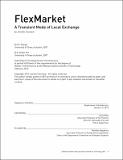FlexMarket : a transient mode of local exchange
Author(s)
Dunnam, Jennifer (Jennifer L.)
DownloadFull printable version (7.438Mb)
Alternative title
Flex Market : a transient mode of local exchange
Transient mode of local exchange
Other Contributors
Massachusetts Institute of Technology. Dept. of Architecture.
Advisor
Carlo Ratti.
Terms of use
Metadata
Show full item recordAbstract
This thesis presents the idea of a networked, transient mode of local food exchange and proposes a responsive infrastructure for integrating dynamic markets within the urban fabric. Focusing on market typologies as an area for critical intervention, I propose a design strategy whereby vendors are liberated from regulated market schedules and retail locations, and mobilized to operate as independent distributors informed by real-time supply and demand fluctuations. A research study is presented on early European traders, modern location theories, and contemporary supply chain logistics in order to contextualize the proposition within a historically evolving spatial relationship between producers and consumers. Using social, environmental, and economic lenses, I assess the benefits of a transient food market for South Tyrol, Italy, a region with a long tradition of agricultural production but where modern advances in technology provide significant advantages for exporting products rather than selling locally. The design research and proposal is presented as four distinct ideas that articulate the emerging role of the 1) producer, 2) products, 3) people, and 4) places within a digitally connected and socially networked environment. The convergence of these ideas establishes the critical design project, which is formalized and tested through a series of future projections that speculate on the spatial evolution of cities as people become increasingly connected and guided within an urban operating system. Topics discussed within this thesis include responsive "plug in" infrastructures, networked people and products, real-time data mining and analysis, and urban operating systems inspired by theories and applications of architectural cybernetics.
Description
Thesis (M. Arch.)--Massachusetts Institute of Technology, Dept. of Architecture, 2012. This electronic version was submitted by the student author. The certified thesis is available in the Institute Archives and Special Collections. Cataloged from student-submitted PDF version of thesis. Includes bibliographical references (p. 76-77).
Date issued
2012Department
Massachusetts Institute of Technology. Department of ArchitecturePublisher
Massachusetts Institute of Technology
Keywords
Architecture.